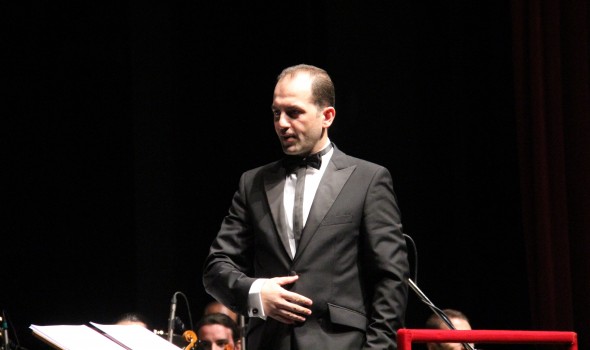‘Here, you can play for everyone in the world’
‘Here, you can play for everyone in the world’

THURSDAY 21 OCTOBER, 2021
Syrian musician Basel Saleh speaks to Migrant Voice about his career so far, and and his plans to make us all fall in love with the oud - one of the world’s oldest instruments.
Destruction forced Basel Saleh to Britain, death brought him into contact with musicians at a London street party, and determination is enabling him to carve out a musical career in a new country.
The destruction was in Syria, the death was that of British MP Jo Cox, and the determination is evident in his drive to make the best of his situation.
Basel was a well-known musicologist and musician, who researched, taught and played at the High Institute of Music in Damascus. Although life in the Syrian capital was largely insulated from the war, the city was hit by occasional explosions and shells, which caused him concern for his children’s safety. “In any place at war you can’t have a normal life,” he says.
He and his musician brother Taim were handpicked by a UK-based non-profit organisation, Africa Express, for a European tour as part of the reconstituted Orchestra of Syrian Musicians, formed before the 2011 outbreak of war.
After playing at Glastonbury Festival and London’s Southbank Centre the brothers became residents of Barnsley, in the northern county of Yorkshire. “I love Barnsley,” he says. “We did a lot of concerts there.”
Despite being an experienced teacher, composer, instrumentalist and singer, he says: “many people here told me you can’t make money from music.” So, he opened a Syrian restaurant.
“I’m a good cook and so is my wife [who joined him with their children, now 7 and 10]. But after four or five months I thought I should play music.”
In Barnsley and London, where he moved after six months, Basel had little trouble establishing himself in British life. “I love people, talking with people, I met people nearly every day,” he says.
On one of those days he went to a street party in Brixton, south London, in memory of Jo Cox, and met the iyatraQuartet, who describe themselves as playing improvised music on orchestral instruments, using folk and world music as starting points. They played together at festivals in London and Brighton and at the Brighton Open Air Theatre. “They are like family,” adds Basel.
It was just a beginning: “British, African, Arabic, Syrian, Egyptian, Iraqi musicians, I met many musicians here. You need a lot of musicians if you want to make an orchestra.”
He also wants to teach Arabic music “In Syria we know everything about European music. Syrians listen to jazz, for example. But Europeans don’t know about Arab music. So we have a chance to share it.
“In Syria we have fifty four different scales, and I have seen that many people here are interested in this. But it’s hard for them to listen.”
That’s why another of his many goals is to make Arabic music harmonious to British ears.
And he will continue composing. “I think that if I compose new music I should make it a mix between Eastern and Western music, using Arabic scale and European harmony, Arabic rhythms and British singers singing in English. We can do it.”
He is confident after conducting a concert with the Royal Liverpool Philharmonic Orchestra, playing Syrian, Lebanese, Egyptian and Andalucian music. Participating artists included Blur and Gorillaz singer Damon Albarn (who is also the lead singer of Blur). “A cellist from Liverpool told me ‘It’s the first time I’ve seen people reacting physically … people standing up and dancing.’”
Basel is brimming with enthusiasm – “In Syria you just play for the Arabic world,” he explains. “Here there is a lot you can do, here you can play for everyone in the world.”
Nevertheless, re-starting life in a new country is not easy.
His youngest son has picked up English quickly (“you’d think he was born here”) and Basel is studying the language four days a week. “My main goal is to do a PhD but I need a high level of English,” he adds.
And as if language, work, accommodation and a new culture were not problems enough, along came Covid.
The disease struck the family twice, and Basel was extremely ill: “I had nine days without food or sleep. I nearly died.”
But they all recovered. His wife is now in her second year at the University of Bedfordshire, studying human resources, and works two days a week at Breadwinners, a non-government organisation that aims to integrate migrants through employment.
Basel has a job, too, teaching children Arabic through music at the Alyasamine school in west London. He has a Syrian masters degree in music education, but says this is “something new for me”. He also gives lessons in playing the oud, a lute-like instrument.
He is busy and has many goals. ”I think if you want to live in London you have got to be patient and work hard because London is for active people. If you want to be lazy, go to a far [away], quiet town.”
+ Lama Bada/Liverpool Philharmonic Orchestra & Orchestra of Syrian Musicians conducted by Bassel Saleh


